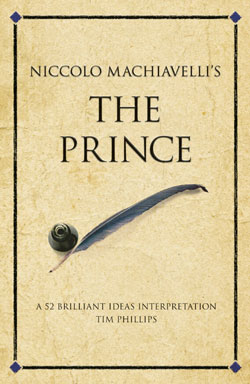Five-hundred years of tyranny?
16 December 2013 by Admin in Business and finance
The Prince (previously titled De Principatibus or About Principalities) was written five-hundred years ago by Italian diplomat Niccolo Machiavelli, following his imprisonment under suspicion of conspiracy. He suffered torture on the rack and afterwards, being disillusioned by injustice and confined within his study under house arrest, he wrote his unapologetically cynical pamphlet. It was to revolutionise the way people think about human behaviour – influencing generations of politicians, military leaders, businesspeople and even global institutions. Published five years after Machiavelli’s death, The Prince now sits among Collodi’s Pinocchio and Dante’s Divine Comedy as one of the most translated Italian texts.
In The Prince, Machiavelli explains how to gain power by any means, and how to hold onto it. He did not feel threatened by notions of hell and judgement or divine wrath; instead he believed that sins can be excused if they have an outcome that is beneficial to society. He regarded success as a strategy game based on strength and cunning, so it is unsurprising that Mussolini wrote his dissertation on The Prince, that politicians are frequently referred to as Machiavellian, and that one of Machiavelli’s most famous pieces of advice is that it is more advantageous to be feared than to be loved: love can be conditional, but fear is ever-present in those who feel intimidated.
Although first recorded five-hundred years ago, Machiavelli’s observations are studied and applied even today. Intimidation tactics are widely used in warfare and, in battle, morality is rarely the primary consideration. In business, it is well known that productivity can be increased by maintaining emotional detachment. It is usually the most ruthless businesspeople who reap the highest returns, and successful global corporations looking to minimise competition often buy out their nearest rival or find a means to crush it. According to Machiavelli, survival is key: in order to thrive in a world where people are deceitful, fickle and underhand, it is necessary to dominate, to be fortunate, and, ultimately, to be feared.
 Although Machiavelli’s outlook on society is a bleak one, the lessons in The Prince offer a way for individuals to control their lives, to influence others and to succeed in their own chosen pathway. Machiavelli was ruthless, selfish, underhand and immoral; he encouraged five generations of tyrannical thinkers. But, crucially, he believed that by emphasising your ‘higher purpose’ and always showing your best side, you were more likely to succeed. And it’s hard to argue with that.
Although Machiavelli’s outlook on society is a bleak one, the lessons in The Prince offer a way for individuals to control their lives, to influence others and to succeed in their own chosen pathway. Machiavelli was ruthless, selfish, underhand and immoral; he encouraged five generations of tyrannical thinkers. But, crucially, he believed that by emphasising your ‘higher purpose’ and always showing your best side, you were more likely to succeed. And it’s hard to argue with that.
Find out more about Machiavelli’s seedbed for controversy in our modern-day interpretation of The Prince, and take a look at this BBC documentary, created to celebrate the five-hundredth anniversary of Machiavelli’s original text.
